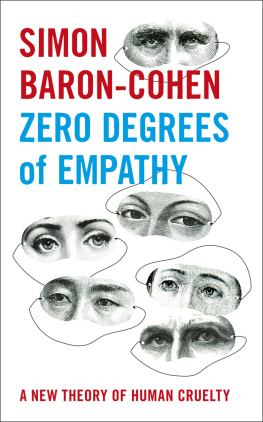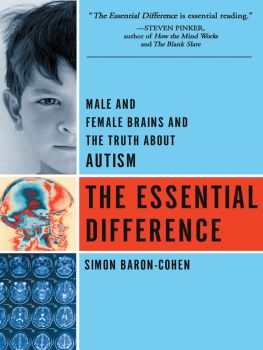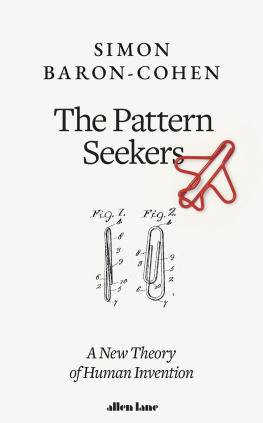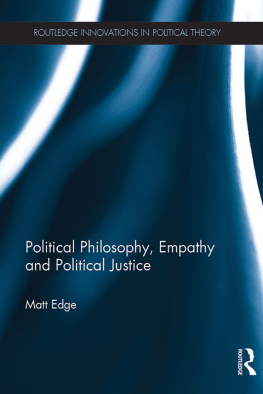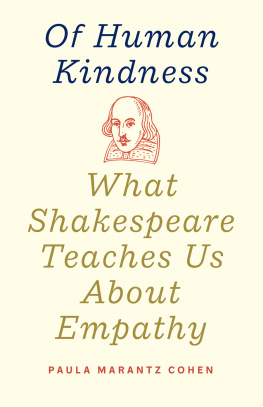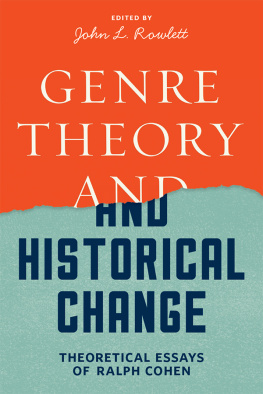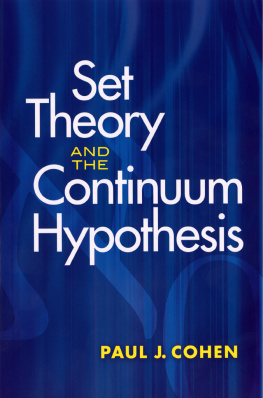Simon Baron-Cohen - Zero Degrees of Empathy: A new theory of human cruelty
Here you can read online Simon Baron-Cohen - Zero Degrees of Empathy: A new theory of human cruelty full text of the book (entire story) in english for free. Download pdf and epub, get meaning, cover and reviews about this ebook. publisher: Penguin Books Ltd, genre: Romance novel. Description of the work, (preface) as well as reviews are available. Best literature library LitArk.com created for fans of good reading and offers a wide selection of genres:
Romance novel
Science fiction
Adventure
Detective
Science
History
Home and family
Prose
Art
Politics
Computer
Non-fiction
Religion
Business
Children
Humor
Choose a favorite category and find really read worthwhile books. Enjoy immersion in the world of imagination, feel the emotions of the characters or learn something new for yourself, make an fascinating discovery.
- Book:Zero Degrees of Empathy: A new theory of human cruelty
- Author:
- Publisher:Penguin Books Ltd
- Genre:
- Rating:3 / 5
- Favourites:Add to favourites
- Your mark:
- 60
- 1
- 2
- 3
- 4
- 5
Zero Degrees of Empathy: A new theory of human cruelty: summary, description and annotation
We offer to read an annotation, description, summary or preface (depends on what the author of the book "Zero Degrees of Empathy: A new theory of human cruelty" wrote himself). If you haven't found the necessary information about the book — write in the comments, we will try to find it.
Zero Degrees of Empathy: A new theory of human cruelty — read online for free the complete book (whole text) full work
Below is the text of the book, divided by pages. System saving the place of the last page read, allows you to conveniently read the book "Zero Degrees of Empathy: A new theory of human cruelty" online for free, without having to search again every time where you left off. Put a bookmark, and you can go to the page where you finished reading at any time.
Font size:
Interval:
Bookmark:

A new theory of human cruelty

ALLEN LANE
an imprint of
PENGUIN BOOKS
ALLEN LANE
Published by the Penguin Group
Penguin Books Ltd, 80 Strand, London WC2R 0RL , England
Penguin Group (USA) Inc., 375 Hudson Street, New York, New York 10014, USA
Penguin Group (Canada), 90 Eglinton Avenue East, Suite 700, Toronto, Ontario, Canada M4P 2Y3 (a division of Pearson Canada Inc.)
Penguin Ireland, 25 St Stephens Green, Dublin 2, Ireland (a division of Penguin Books Ltd)
Penguin Group (Australia), 250 Camberwell Road, Camberwell, Victoria 3124, Australia
(a division of Pearson Australia Group Pty Ltd)
Penguin Books India Pvt Ltd, 11 Community Centre, Panchsheel Park, New Delhi 110 017, India
Penguin Group (NZ), 67 Apollo Drive, Rosedale, Auckland 0632, New Zealand
(a division of Pearson New Zealand Ltd)
Penguin Books (South Africa) (Pty) Ltd, 24 Sturdee Avenue, Rosebank 2196, South Africa
Penguin Books Ltd, Registered Offices: 80 Strand, London WC2R 0RL , England
www.penguin.com
First published 2011
Copyright Simon Baron-Cohen, 2011
The moral right of the author has been asserted
Grateful acknowledgement is given to the following for permission to reproduce photographs: 882 IAM/akg/World History Archive (inmates in Dachau (p. 2)); Harvard Widener Library & Central Zionist Archives (Martin Buber (p. 5)); Jeff J. Mitchell/Getty Images (Capuchin monkeys (p. 97)); Benny Gool (Desmond Tutu (p. 123))
All rights reserved. Without limiting the rights under copyright reserved above, no part of this publication may be reproduced, stored in or introduced into a retrieval system, or transmitted, in any form or by any means (electronic, mechanical, photocopying, recording or otherwise) without the prior written permission of both the copyright owner and the above publisher of this book
ISBN: 978-0-71-819334-8
In memory of
Peter Lipton (19502007) Professor of Philosophy of Science, Cambridge University, who combined precision in explanation with humour and compassion
and
Judy Ruth Greenblatt (19332008) who gave her five children and five grandchildren their internal pot of gold
This book isnt for people with a sensitive disposition. You cant write about human cruelty in a cheerful way, so if youre looking for a fun read proceed no further. In this book I attempt to redefine evil in terms of empathy, and look at why some people have more or less empathy than others, and what happens when we lose it. Distressing and even shocking as the material may be, the nature of empathy is (to me, at least) endlessly fascinating, and the research behind it has been exciting (an odd choice of word in the circumstances), primarily because I have such a wonderful group of talented scientists as colleagues. I am pleased to have the chance to thank them here.
Scientists collect bizarre things (Darwin famously collected beetles and finches). In our case, as empathy researchers, we collected emotions! Our DVD Mindreading) as a fun way to teach empathy to preschool children with autism who struggle to achieve this.
Scientists also develop new ways to measure things. For us, the challenge was to come up with new ways to measure individual differences in empathy. First, Sally Wheelwright, Carrie Allison, Bonnie Auyeung and I developed the Empathy Quotient (EQ). Youll find this in Appendix 1. To track down where empathy might be hiding, Chris Ashwin, Bhismadev Chakrabarti, Mike Lombardo, John Suckling, Ed Bullmore, Meng-Chuan Lai, Matthew Belmonte, Jac Billington, John Herrington, Howard Ring, Steve Williams, Marie Gomot, Ilaria Minio-Paluello and I conducted brain-scanning studies. To investigate the trouble with testosterone and its impact on empathy, Bonnie Auyeung, Rebecca Knickmeyer, Emma Ashwin (ne Chapman), Svetlana Lutchmaya, Liliana Ruta, Erin Ingudomnukul, Lindsay Chura, Kevin Taylor, Peter Raggat, Gerald Hackett and I collected amniotic fluid from babies and blood samples from adults. Bhismadev Chakrabarti, Frank Dudbridge, Sharmila Basu, Carrie Allison, Sally Wheelwright, Grant Hill-Cawthorne, Lindsey Kent and I also hunted for empathy genes. All of these projects have been fascinating.
Keeping a busy research lab running smoothly while writing a book assumes wonderful administrative support: Gaenor Moore, Paula Naimi, Jenny Hannah, Carol Farmer and Rachel Jackson have been an amazing admin team. Gaenor also cheerfully compiled the references for this book, no small feat, for which I am extremely grateful. Bhismadev Chakrabarti and Mike Lombardo both generously commented on draft chapters in this book. Mike in particular taught me more social neuroscience during this process, which was invaluable.
Helen Conford and Stefan McGrath at Penguin UK have been patiently waiting for this book since 2004! Helen gave me insightful, careful feedback as the book took shape. It took six years to write because the hunt for empathy genes is not quick. Katinka Matson and John Brockman, my agents, showed the same remarkable patience in waiting for this book to be born. I am indebted to Charlotte Ridings and Jan Kristiannson for their excellent editorial suggestions, and to Thomas Keheller at Basic Books for his support.
I give special thanks to Bridget Lindley for all her support, to my parents (Judy and Vivian) and siblings (Dan, Ash, Liz and Suzie) for their dependable humour, and to my children, Sam, Kate and Robin, for their playfulness and encouragement. I hope I gave them enough of the internal pot of gold that I got from my parents, who got it from theirs.
I have been studying empathy for thirty years, and my aim now is to put this remarkable substance on to the table so we can all look at it from every angle. In my first book, Mindblindness, I focused on one part of the nature of empathy (the part related to how we understand other people, that is, the cognitive part of empathy) and on the case of autism, where empathy difficulties abound. In my second book, The Essential Difference, I included the second part of empathy (the part related to our emotional reactions to people, that is, the affective part of empathy), and on how the two sexes differ in empathy. In that book I again explored the flip side of empathy, with an analysis of the difficulties people with autism face in acquiring this essential skill.
Now, in Zero Degrees of Empathy, I examine why some people become capable of cruelty, and whether a loss of empathy inevitably has this consequence. This book goes deeper into the subject than I have gone before, by drilling down into the brain basis of empathy and looking at its social and biological determinants, and it is broader too, by having a close look at some of the medical conditions that lead to a loss of empathy. My main goal is to understand human cruelty, replacing the unscientific term evil with the scientific term empathy.
Those readers who wish to pursue the subject in more depth will find the relevant scientific papers (indicated by Arabic numbers) listed in the References starting on .
When I was seven years old, my father told me the Nazis had turned Jews into lampshades. Just one of those comments that you hear once and the thought never goes away. To a childs mind even to an adults these two types of thing just dont belong together. He also told me the Nazis turned Jews into bars of soap. It sounds so unbelievable, yet it is actually true. I knew our family was Jewish, so this image of turning people into objects felt a bit close to home.
Next pageFont size:
Interval:
Bookmark:
Similar books «Zero Degrees of Empathy: A new theory of human cruelty»
Look at similar books to Zero Degrees of Empathy: A new theory of human cruelty. We have selected literature similar in name and meaning in the hope of providing readers with more options to find new, interesting, not yet read works.
Discussion, reviews of the book Zero Degrees of Empathy: A new theory of human cruelty and just readers' own opinions. Leave your comments, write what you think about the work, its meaning or the main characters. Specify what exactly you liked and what you didn't like, and why you think so.

